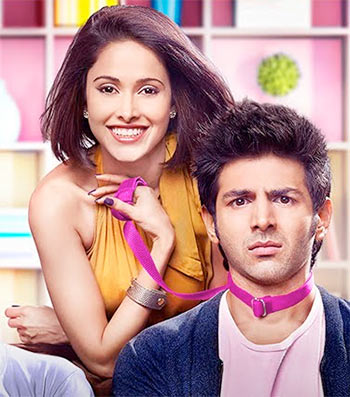 Pyaar Ka Punchnama 2 contains some genuine belly laughs, and would have been perfect were it not for its feature-length running time, writes Raja Sen.
Pyaar Ka Punchnama 2 contains some genuine belly laughs, and would have been perfect were it not for its feature-length running time, writes Raja Sen.
Let’s start by setting the record straight: misogyny is not the problem here.Â
Sure, misogyny is certainly a giant (and growing) problem, but the beliefs of the filmmaker should never get in the way of an appreciation of their film.
Luv Ranjan, going by the first Pyaar Ka Punchnama and this sequel, may well be a man who has lost all faith in the fairer sex (or, indeed, in their fairness), but the only question that must be asked of Pyaar Ka Punchnama 2 is simply whether it is funny enough.Â
No, no it isn’t.Â
Watching Pyaar Ka Punchnama 2 is like watching an online Indian comedy sketch.
It contains some genuine belly laughs, significant stereotyping and much generalisation, and some original insightful zingers.
This would all be perfectly great were it not for its feature-length running time. (Imagine TVF’s sketch with the father asking for Twitter advice lasting more than two hours.)Â
The idea is that men are doormats and women wreck their lives. This is not in itself a premise we haven’t laughed at before, in sharper sitcoms or better-written films, but Ranjan’s commitment to his cause is alarmingly militant.
In what is scripted almost like a work of cautionary propaganda, all the men are superlatively sterling, and all the women plain evil.
The jokes aren’t bad per se but the fact that they all seem to be heading toward this demented kind of lecturing, well, robs them of any good humour.
More than laughing I felt instead like stepping away, slowly.Â
It starts off with three boys -- relatively well-to-do man-children living together in the kind of mancave that has a motorcycle as an accessory -- meeting their three girls.
These encounters range from sweet to utterly tasteless but there is something refreshing (and, to me, surprising) about how all these boys and girls look at dating and courtship as a sport built on awareness.
A boy tosses a line, a girl lobs it back, and the fact that they’re hooking up is already a given. Who has time for even verbal foreplay anymore? All you need, the film explains, is confidence.Â
There are a couple of decent gags here.
Sunny Singh, the most endearing performer in the film, a gullible but sincere computer engineer, meets his girl at a wedding. She starts off calling him 'Siddharth Bhaiya' but bites her tongue at the 'bhaiya' later on when he’s driving her home, and Singh’s quiet jubilation at this, um, bhaiyalessness is almost Thackeray-like.
Later the boys reference the ultimate male-bonding film, the genius that is Chashm-e-Buddoor, by appropriating the line 'muh kadwa kar le' but using it for beer, not cigarettes, and Singh describes a girl’s name as so sweet as if sung by Lataji.Â
The girls get a couple of stray laughs, with one girl who works at a BPO constantly stung and correcting anyone who uses the words 'call-centre', and another girl in shorts -- Nushrat Bharucha, who takes on her hammy role with genuine, almost infectious enthusiasm -- who feigns enthusiasm for a cricket match a couple of times before she stops pretending that it’s more interesting than her Whatsapp.
Yet, despite a few good gags, these are not characters but merely types, all of whom are sacrificed at the altar of Ranjan’s Jugheaded belief system.
One of the boys who was so confident he picked up a girl by asking her to tattoo his name on her hand lest she forget it, himself forgets all this confidence as he turns, overnight, into a slave.
As do the other boys.
Meanwhile, just in case we haven’t noticed, the soundtrack starts telling us that they literally ‘have become dogs.’Â
Okay then.Â
This is not a bad film per se, but a genuinely misguided one.
The first film had three grown men reduced to snivelling, sobbing losers by the end, but it did show some crackling camaraderie between its leads.
This time the men don’t cry but emerge even more pathetic, chained to a trio of witches who seem to have enchanted them while never giving them an ounce of happiness.Â
And forget about hurting our sentiments, this juvenile single-minded immaturity hurts the comedy. It hurts the writing. It hurts the characters. It hurts the film.
As for Mr Ranjan, I’m hoping the film’s climax was merely a feeble joke and not an indicator that he idolises Norman Bates.Â
Rediff Rating:Â 
